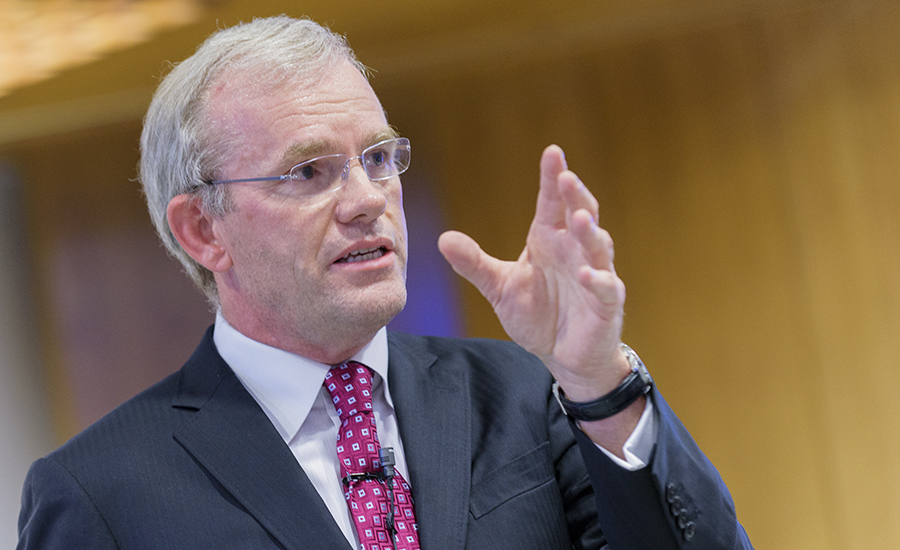
“The world is experiencing huge change at the moment, the industrial internet is the next revolution, and I think Spain has an opportunity to lead,” asserted Mark Hutchinson, president and CEO of General Electric Europe, during his presentation at the IESE Madrid campus last month.
“Populism is on the rise,” he says, “People are discontented with infrastructure, and business has been blamed a lot.” Against the backdrop of a tough business landscape, Hutchinson spoke about the evolution of GE, its strategy for creating growth, and Spain´s role within this.
The Local Global Company
Spanning 170 countries, “We see ourselves as a technology company based around the world,” says Hutchinson. Therefore, “as a global company, we have to be meaningful and local everywhere.” For example, in Saudi Arabia GE employ 3,000 women from the area.
The Next Industrial Revolution
To stay competitive, the company has undergone a major transformation over the past two years and is now on the cusp of a new wave – the digital industrial revolution. “GE was formed by Thomas Edison 140 years ago,” Hutchinson reminds us, and “we´ve bet our company on digital because we want to be around for another 140 years. We´ve been at every industrial revolution so we´re in a good position for the fourth wave.”
When they sold GE Capital and bought two thirds of Alstom, GE was transformed from a finance business, going through what Hutchinson describes as “an Industrial pivot”, to then operate in power, aviation, healthcare, oil and gas. “Now we´re going through our next pivot,” says Hutchinson, “this is the digital world.”
The digital industrial revolution is ultimately driven by the evolving needs of the customer. “We need to sell differently because customers are now buying differently,” asserts Hutchinson, “they are buying outcomes rather than products.”
For example, in the past a healthcare customer might request a number of MRI machines. Now that same customer may ask for a solution to ensure a hospital deals with a certain number patients in a given period.
To help customers achieve these outcomes, “there´s a big emphasis on understanding the physical asset, then on how to use data to improve productivity and understand customers better, and then on looking at different ways to manufacture,” explains Hutchinson.
For example, “a flight from London to Frankfurt throws off a terabyte of data. How you use all this data is the next value,” says Hutchison. By monitoring physical assets like planes and locomotives with the use of sensors, GE gathers data to create digital twins. This enables them to analyze the physical assets, and predict maintenance to minimize downtime, thereby maximizing productivity. “GE has made a ´big bet´ on digital.” Rather than just paying lip service by appointing a Chief Digital Officer, says Hutchinson, the company has pulled out all the stops to ´poach´ digital talent from Silicon Valley to reinvent itself. “The market was skeptical about a data scientist joining General Electric but they liked our aspiration,” says Hutchinson.
GE has created the open operating system to be used by both themselves and competitors – Predix, a pay-as-you-go industrial cloud based platform.
“We´re also seeing another revolution,” adds Hutchinson, “additive manufacturing, e.g. 3D printing, enables you to build the perfect piece with 10 percent of the materials – we’re making big investments in this.”
Spain to Lead the Charge?
The consumer internet was won by Silicon Valley but there are many players vying to be the home of the industrial internet – “so why not Spain?” asks Hutchinson. “In a volatile world, Spain has an advantage – it deals with change well. Going through the crisis and becoming export-oriented was wonderful.”
Furthermore, “GE is a European company. We like Europe because it´s as competitive as the U.S., and sometimes even China or India. More importantly,” he adds, “the engineering talent in Europe is second to none – that talent is very mobile, and we can use it all over the world.”
The Start-Up Within
GE may have already employed 20,000 software engineers, but their reinvention was helped along by their intrapreneurial attitude – “we see ourselves as a start-up company within a company,” says Hutchinson.
“We try and fight bureaucracy by delayering the organization and empowering people. We need to teach people that it´s ok to fail – that´s how we learn. We´re teaching teams to try, fail and try again.”